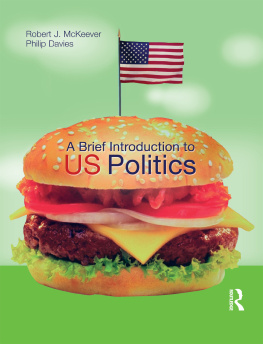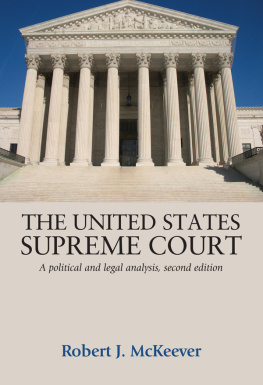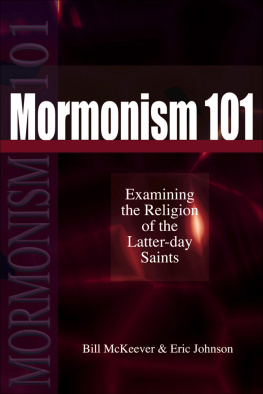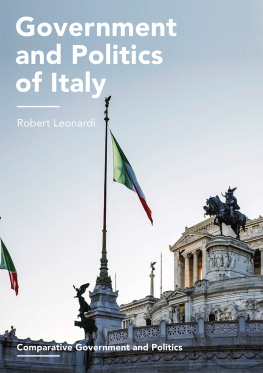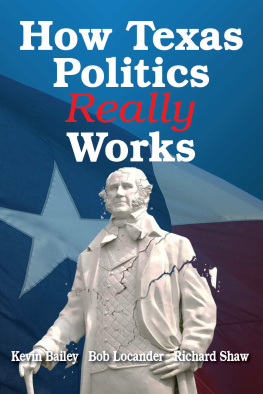A Brief Introduction to US Politics
A Brief Introduction to US Politics
Robert McKeever and Philip Davies
First published 2006 by Pearson Education Limited
Published 2014 by Routledge
2 Park Square, Milton Park, Abingdon, Oxon OX14 4RN
711 Third Avenue, New York, NY 10017, USA
Routledge is an imprint of the Taylor & Francis Group, an informa business
Copyright 2006, Taylor & Francis.
The rights of Robert McKeever and Philip Davies to be identified as authors of this work have been asserted by them in accordance with the Copyright, Designs and Patents Act 1988.
All rights reserved. No part of this book may be reprinted or reproduced or utilised in any form or by any electronic, mechanical, or other means, now known or hereafter invented, including photocopying and recording, or in any information storage or retrieval system, without permission in writing from the publishers.
Notices
Knowledge and best practice in this field are constantly changing. As new research and experience broaden our understanding, changes in research methods, professional practices, or medical treatment may become necessary.
Practitioners and researchers must always rely on their own experience and knowledge in evaluating and using any information, methods, compounds, or experiments described herein. In using such information or methods they should be mindful of their own safety and the safety of others, including parties for whom they have a professional responsibility.
To the fullest extent of the law, neither the Publisher nor the authors, contributors, or editors, assume any liability for any injury and/or damage to persons or property as a matter of products liability, negligence or otherwise, or from any use or operation of any methods, products, instructions, or ideas contained in the material herein.
ISBN 13: 978-0-582-47341-6 (pbk)
British Library Cataloguing-in-Publication Data
A catalogue record for this book is available from the British Library
Library of Congress Cataloging-in-Publication Data
A catalogue record for this book is available from the Library of Congress
Typeset in 10/12.5pt ITC Century by 35
This short version of Politics USA is intended for the student or teacher who needs an introduction to the essential features of the American political system. The United States is a complex democracy. Its structural roots date from the eighteenth century, as do its founding concepts of popular sovereignty and republicanism. Yet in the two centuries and more since the Constitution of 1787 was created, the United States has undergone dramatic change. A political system designed for thirteen states aligned along the Atlantic coast must now serve the needs of a diverse, continental nation that possesses economic and military prowess beyond the imagination of the Founding Fathers.
This book aims to provide its readers with a coherent and succinct account of how contemporary American politics blends enduring principles with the realities and demands of the present day. Our goal is to build an understanding of American politics in a logical series of steps. We begin with a brief overview of American society today that sets the scene of the analysis to come. The first two chapters then introduce you to the constitutional framework of American politics and the fluid concept and practice of federalism. While these subjects may be considered dry, they are essential to a sound understanding of politics in the United States. As with the book as a whole, we aim to provide an intelligent but accessible analysis to constitutionalism and federalism. Key terms and concepts are explained in a way that enables the reader to employ them with confidence.
We move next to the major features of the representative process: elections, of course, but also the main players in electoral politics, such as parties, interest groups and the media. We also analyse the challenges to democracy presented by an electoral system highly dependent upon television and awash with interest-group money.
The following three chapters examine the major institutions of the federal government the presidency, the Congress and the Supreme Court. These embody the constitutional principle of the separation of powers, but we explain how these three institutions are simultaneously independent yet constrained by each other. We pay particular attention to the evolution of these institutions since 1787, since none plays its role quite as envisaged by the framers. Above all, we provide a clear analysis of the powers and limitations of these central elements of national government.
One of the inevitable features of a short introductory text is a relative paucity of examples and case studies. In order to counter this, we conclude the book with two chapters that show the way that government and politics work in connection with the systems main outputs: domestic and foreign policies. Readers are thus able to gain knowledge of the main policy issues that constitute the American political agenda today, but are also able to evaluate the way in which the system as a whole works.
Finally, we hope that by providing an accurate, up-to-date and accessible introduction to American politics, we also stimulate a desire to learn more about this unique and powerful country that we, the authors, continue to find fascinating.
The authors are particularly indebted to Morten Fuglevand, who conceived the project in the first place and who brought it to fruition with his customary patience and good humour.
Bob McKeever
Phil Davies
Acknowledgements
We are grateful to the following for permission to reproduce copyright material:
Mark Fiore.
In some instances we have been unable to trace the owners of copyright material, and we would appreciate any information that would enable us to do so.
This book is dedicated with love to Heather McKeever and to Rosamund Davies
Introduction: American government and politics
Understanding the political system of any country depends in part upon understanding its culture. By culture we mean the values, traditions and aspirations of a nation. These in turn are in part dependent upon the social make-up of the country, its economic system and the way it interacts with the rest of the world. Viewed through the prism of culture, the American political system in the early twenty-first century presents a fascinating but complex picture.
For anyone coming new to American politics, the first thing to understand is that the United States is a very diverse country. There are 50 States with many geographical, political and cultural differences between them. The politics and culture of Texas, for example, are very different from those of New York, California or Vermont. There is also a tremendous diversity of ethnic and racial groups, so that it is no longer a simple matter to describe a typical American, even though non-Americans are still tempted to use stereotypes. Most striking of all, perhaps, are the different lifestyles to be found in the United States. The country that led the world in such matters as feminism, gay rights and youth culture is also a country where many are deeply religious and adopt a traditional standpoint in their opposition to these developments.






